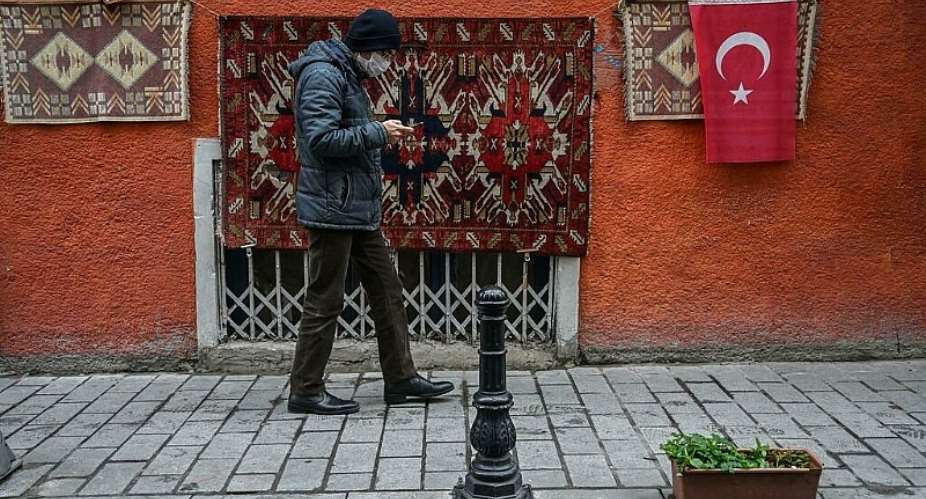Dokuz Sekiz news web portal is one of a myriad of independent Turkish outlets that's opened up on social media in recent years. Like many others, it receives international support. But Turkey's presidential head of communication, Fahrettin Altun, is accusing foreign-funded media organizations of acting as a "fifth column," undermining the government at the bidding of foreign powers.
But Dokuz Sekiz chief editor Gokhan Bicici dismisses the allegation, seeing the move as a sign of the government weakening media control.
"Ninety percent of mainstream media outlets are in control of the government. But they are facing the fact that these media outlets are no more effective to have control over the public opinion," said Bicici.
"They [government] are giving these media outlets hundreds of times more financial sources that we can even think about, that we can take from any foundation or foreign source. They want to make legislation that directly targets independent and critical media organizations. They defend these regulations with the thesis that those media outlets are supported by foreign governments."
Social media and news
The proposed legislation comes after social media news portals, such as Dokuz Sekiz, exposed the government's failure to deal with devastating wildfires that wrought death and destruction across much of Turkey's Mediterranean and Aegean regions.
Opposition mayors in the fire-stricken regions used the social media news platforms to call for assistance and expose the lack of support they were receiving, contradicting the government's narrative slavishly broadcast on mainstream media that everything was under control.
The government, anxious to avoid a repeat of such humiliation, is now introducing legislation to regulate and limit foreign funding of social media sites. Domestic and international rights groups have condemned the move. Turkey is already ranked 143 out of 180 countries for media freedom by the Paris-based Journalists Without Borders.
"I am concerned because it has always been very difficult in Turkey to develop a local system for funding independent journalism projects," said Erol Onderoglu, Journalists Without Borders, Turkey's representative.
Foreign funding
Onderoglu says given the climate of government intimidation in Turkey, means most companies avoid advertising on social media platforms, so foreign funding plays a key role.
"Many of the serious news portals are so dynamic thanks to international donor contributions. I think the government knows very well where to target," added Onderoglu.
The proposed legislation includes a jail sentence of up to three years for disseminating fake news. The legislation, if passed, will likely be seized upon by the country's zealous prosecutors; Turkey is already, according to rights groups, among the world's worst jailers of journalists.
But the increasing pressure on independent Turkish news is a sign of its success, claims Atilla Yesilada. Yesilada is a political analyst for Global Source Partners.
"The main motivation is Erdogan's approval ratings are dropping as we speak. Erdogan understands one of the main pillars of his long reign is his ability to control the news flow to the public," said Yesilada.
'But social media, YouTube, and these alternative media have become the number one news source," he added. "And he is getting desperate; we have another Covid wave, I think it's started, and the economy is in a miserable condition."
Disenchanted by traditional outlets
People are increasingly turning to social media for news, likely disenchanted by government-controlled TV stations' constant barrage of feel-good reporting. In addition, Turkey is scheduled for both presidential and parliamentary elections in 2023.
"They[government] have to act aggressively because the time of the government is over; they know that," said Dokuz Sekiz editor Bicici.
"Support of the oppositional parties is growing. They can see it in all the researches. They will try to destroy these social media outlets, But they will not be able to. The government is not as strong as they were in 2015 16 or 17. I think everything they can do against us maybe can even make us stronger."
The government insists the measures are simply aimed at protecting the integrity of the media. But given Erdogan's need to play catch up for the first time in his career, the pressure on independent social media is likely to grow.





 Adu Boahen’s murder: Police arrest house help who was in possession of deceased’...
Adu Boahen’s murder: Police arrest house help who was in possession of deceased’...
 Akufo-Addo nominates Felicia Attipoe as Tema West MCE
Akufo-Addo nominates Felicia Attipoe as Tema West MCE
 Election 2024: I can't have someone I defeated twice as my successor – Akufo-Add...
Election 2024: I can't have someone I defeated twice as my successor – Akufo-Add...
 We’ll protect state wealth from opaque deals – Prof Jane Naana
We’ll protect state wealth from opaque deals – Prof Jane Naana
 Mauritania president says running for second term in June polls
Mauritania president says running for second term in June polls
 I won't ever say I was a mere driver’s mate' — Prof. Opoku-Agyemang
I won't ever say I was a mere driver’s mate' — Prof. Opoku-Agyemang
 2024 polls: 'EC struggling to defend credibility'— Prof. Opoku-Agyemang
2024 polls: 'EC struggling to defend credibility'— Prof. Opoku-Agyemang
 NPP will remain in gov’t till Jesus comes — Diana Asamoah
NPP will remain in gov’t till Jesus comes — Diana Asamoah
 Sunyani Technical University demands apology from former SRC president over sex-...
Sunyani Technical University demands apology from former SRC president over sex-...
 'Dumsor' was resolved by Mahama but ‘incompetent' Akufo-Addo has destroyed the g...
'Dumsor' was resolved by Mahama but ‘incompetent' Akufo-Addo has destroyed the g...
